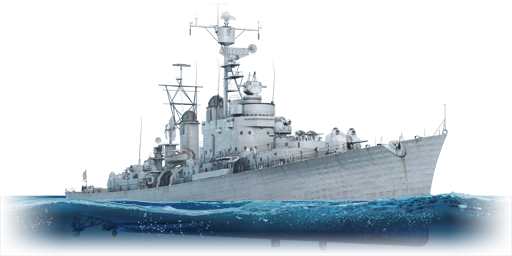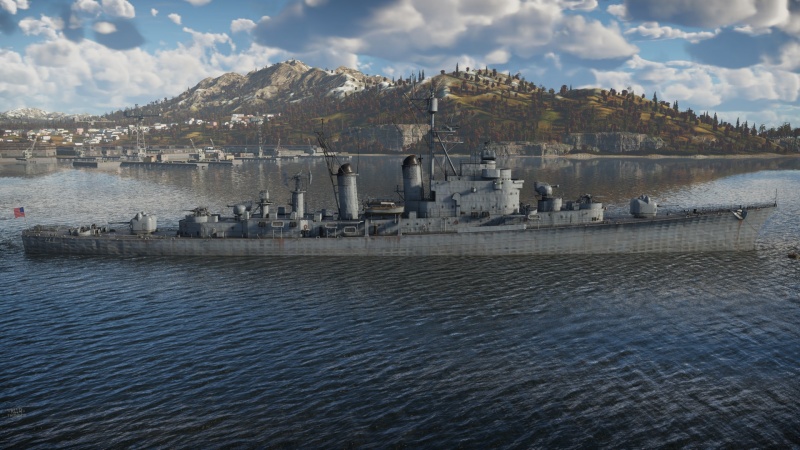Difference between revisions of "USS Mitscher"
Colok76286 (talk | contribs) (Edits / Plagiarism from wikipedia:USS_Mitscher_(DL-2)) |
R_nminbiY_n (talk | contribs) (Manufacturer template) |
||
| Line 12: | Line 12: | ||
{{Specs-Fleet-Armour}} | {{Specs-Fleet-Armour}} | ||
<!-- ''Talk about the vehicle's armour. Note the most well-defended and most vulnerable zones, e.g. the ammo magazine. Evaluate the composition of components and assemblies responsible for movement and manoeuvrability. Evaluate the survivability of the primary and secondary armaments separately. Don't forget to mention the size of the crew, which plays an important role in fleet mechanics. Save tips on preserving survivability for the "Usage in battles" section. If necessary, use a graphical template to show the most well-protected or most vulnerable points in the armour.'' --> | <!-- ''Talk about the vehicle's armour. Note the most well-defended and most vulnerable zones, e.g. the ammo magazine. Evaluate the composition of components and assemblies responsible for movement and manoeuvrability. Evaluate the survivability of the primary and secondary armaments separately. Don't forget to mention the size of the crew, which plays an important role in fleet mechanics. Save tips on preserving survivability for the "Usage in battles" section. If necessary, use a graphical template to show the most well-protected or most vulnerable points in the armour.'' --> | ||
| − | Built during the early Cold War to serve as a "Destroyer leader" to be armed with various armaments for different targets, | + | Built during the early Cold War to serve as a "Destroyer leader" to be armed with various armaments for different targets, Mitscher is unusually large. At a whopping 150 m in length and over 4,800 tons of displacement, she even dwarfs the Japanese experimental cruiser [[IJN Yubari|Yubari]] and has a size closer to that of light cruisers. |
| − | Despite her size, however, | + | Despite her size, however, Mitscher is barely armoured. The ship only has thin armour to protect the two cannon turrets and a gun shield for Oerlikon autocannons, the ship will attract incoming fire from all gun calibres and take full damage. Her internal modules are unprotected and can be easily damaged, especially her rocket ammo racks that can be easily detonated due to lack of protection. |
=== Mobility === | === Mobility === | ||
| Line 86: | Line 86: | ||
* Very poor burst damage | * Very poor burst damage | ||
* Rocket ammo racks can be easily detonated | * Rocket ammo racks can be easily detonated | ||
| + | * Fixed torpedoes mean ship has to be manoeuvred to aim | ||
== History == | == History == | ||
| Line 111: | Line 112: | ||
* [[wt:en/news/7385-development-uss-mitscher-dl-2-new-standards-en|[Devblog] USS Mitscher (DL-2): New Standards]] | * [[wt:en/news/7385-development-uss-mitscher-dl-2-new-standards-en|[Devblog] USS Mitscher (DL-2): New Standards]] | ||
| + | {{ShipManufacturer Bath Iron Works}} | ||
{{USA destroyers}} | {{USA destroyers}} | ||
Revision as of 11:50, 27 November 2021
Contents
Description
The Mitscher-class, USS Mitscher (DL-2), 1954 is a rank II American destroyer with a battle rating of 4.7 (AB/RB/SB). It was introduced in Update "Ground Breaking".
General info
Survivability and armour
Built during the early Cold War to serve as a "Destroyer leader" to be armed with various armaments for different targets, Mitscher is unusually large. At a whopping 150 m in length and over 4,800 tons of displacement, she even dwarfs the Japanese experimental cruiser Yubari and has a size closer to that of light cruisers.
Despite her size, however, Mitscher is barely armoured. The ship only has thin armour to protect the two cannon turrets and a gun shield for Oerlikon autocannons, the ship will attract incoming fire from all gun calibres and take full damage. Her internal modules are unprotected and can be easily damaged, especially her rocket ammo racks that can be easily detonated due to lack of protection.
Mobility
Being a destroyer, the Mitscher is reasonably fast and manoverable, though her large displacement for her class and long length limit her acceleration and agility.
| Mobility Characteristics | |||
|---|---|---|---|
| Game Mode | Upgrade Status | Maximum Speed (km/h) | |
| Forward | Reverse | ||
| AB | |||
| Upgraded | 83 | 35 | |
| RB/SB | |||
| Upgraded | 68 | 29 | |
Modifications and economy
Armament
Primary armament
The main armament for the Mitscher is two 127 mm/54 Mark 18 autocannons mounted in a single turret at the bow and stern. The main turrets can be fully traversed and have very good coverage. While there are only two main guns for the ship which severely limits its burst damage, this is balanced by extremely fast reload time of 2 seconds and thus allows the Mischer to deal a similar continuous damage output as other destroyers at her BR range.
The Mitscher has three type of shells; an HE shell with similar damage output to other American destroyers, an SAP shell with very good penetration of 97 mm at 5,000 m that is capable of damaging enemy cruisers, and an HE-VT shell that is very useful for engaging aircraft thanks to the gun's wide coverage and fast reload.
Secondary armament
Some ships are fitted with weapons of various calibres. Secondary armaments are defined as weapons chosen with the control Select secondary weapon. Evaluate the secondary armaments and give advice on how to use them. Describe the ammunition available for the secondary armament. Provide recommendations on how to use them and which ammunition to choose. Remember that any anti-air armament, even heavy calibre weapons, belong in the next section. If there is no secondary armament, remove this section.
Anti-aircraft armament
An important part of the ship's armament responsible for air defence. Anti-aircraft armament is defined by the weapon chosen with the control Select anti-aircraft weapons. Talk about the ship's anti-air cannons and machine guns, the number of guns and their positions, their effective range, and about their overall effectiveness – including against surface targets. If there are no anti-aircraft armaments, remove this section.
Special armament
Mortars, rocket launchers and missiles are also effective in skilled hands and can take an off-guard opponent by surprise. Evaluate the ammunition of this type of armament and rate its performance in combat. If there are no special armaments, remove this section.
Additional armament
Describe the available additional armaments of the ship: depth charges, mines, torpedoes. Talk about their positions, available ammunition and launch features such as dead zones of torpedoes. If there is no additional armament, remove this section.
Usage in battles
Describe the technique of using this ship, the characteristics of her use in a team and tips on strategy. Abstain from writing an entire guide – don't try to provide a single point of view, but give the reader food for thought. Talk about the most dangerous opponents for this vehicle and provide recommendations on fighting them. If necessary, note the specifics of playing with this vehicle in various modes (AB, RB, SB).
Pros and cons
Pros:
- Rapid-firing 127 mm autocannons capable of delivering continuous damage
- Main turrets have good coverage and is fully traverseable
- Wide range of autocannons to deal against surface and aerial targets
- Rockets can prove devastating at close range
Cons:
- The largest destroyer in the game with the size of a light cruiser, can be easily targeted
- Virtually no armour to protect her from HE shells
- Only two main guns, its effectiveness is significantly decreased when one or both is disabled
- Very poor burst damage
- Rocket ammo racks can be easily detonated
- Fixed torpedoes mean ship has to be manoeuvred to aim
History
Describe the history of the creation and combat usage of the ship in more detail than in the introduction. If the historical reference turns out to be too long, take it to a separate article, taking a link to the article about the ship and adding a block "/History" (example: https://wiki.warthunder.com/(Ship-name)/History) and add a link to it here using the main template. Be sure to reference text and sources by using <ref></ref>, as well as adding them at the end of the article with <references />. This section may also include the ship's dev blog entry (if applicable) and the in-game encyclopedia description (under === In-game description ===, also if applicable).
Media
Excellent additions to the article would be video guides, screenshots from the game, and photos.
See also
Links to articles on the War Thunder Wiki that you think will be useful for the reader, for example:
- reference to the series of the ship;
- links to approximate analogues of other nations and research trees.
External links
| Bath Iron Works | |
|---|---|
| Patrol Torpedo Boat (PT) | |
| 89’ Experimental PT | PT-810 |
| Destroyer Escorts (DE) | |
| Dealey-class | USS Dealey |
| Gun Destroyers (DD) | |
| Wickes-class | HMS Montgomery* |
| Somers-class | USS Davis |
| Gearing-class | USS Frank Knox |
| Destroyer Leaders (DL) | |
| Mitscher-class | USS Mitscher |
| *USS Wickes in UK service | |
| USA destroyers | |
|---|---|
| Clemson-class | USS Welborn C. Wood · USS Barker · USS Litchfield |
| Farragut-class | USS Aylwin |
| Bagley-class | USS Bagley |
| Porter-class | USS Porter · USS Phelps · USS Moffett |
| Somers-class | USS Somers · USS Davis |
| Fletcher-class | USS Fletcher · USS Bennion · USS Cowell |
| Allen M. Sumner-class | USS Sumner |
| Gearing-class | USS Gearing · USS Frank Knox |
| Mitscher-class | USS Mitscher · USS Wilkinson |





